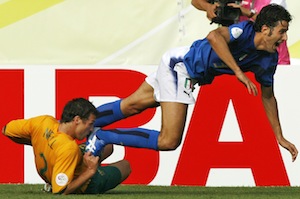
Australia's Lucas Neill, bottom, trips Italy's Fabio Grosso in the penalty box during the last minutes of the Australia vs Italy Round of 16 World Cup soccer match at Fritz Walter Stadium in Kaiserslautern, Germany, Monday, June 26, 2006. Italy was awarded a penalty and won the match 1-0. AP Photo/Kevork Djansezian
Four years on, and with another World Cup on the horizon, Australia’s indignation over Fabio Grosso’s dive to send Italy to the quarters in Germany at the expense of the Socceroos still cuts deep.
The controversy has reignited as a topic of debate as a result of Grosso’s admission that he “accentuated” his fall over the grounded Lucas Neill in the final minutes of the Round of 16 match in Kaiserslautern.
(Accentuated, in case you were wondering, means “to make more noticeable or prominent”, according to my Mac’s dictionary.)
Grosso, speaking to The Roar’s own Davidde Corran in the Football + World Cup preview magazine, said, “In this instance when Neill slid in, maybe I accentuated it a little bit. However you must remember it was the last minute of an extremely difficult game and everyone was tired.
“I felt the contact so I went down. Therefore, I say again, I didn’t initiate it … it’s true that I felt the touch and didn’t have the strength to go forward. Some people believe me, and some don’t. However for me, even after seeing the video images, it’s a penalty.
“I admit that it wasn’t glamorous but it wasn’t a scandal,” he said.
Maybe not a scandal for Grosso and the triumphant Italians, but a huge scandal that still lingers with Socceroos fans.
Listening and reading the responses to the debate four years on presents a fascinating portrait of Australia’s naivety when it comes to the nuances of the world game.
Australia was undoubtedly the victim of gamesmanship by Grosso – an unsightly and unfortunate aspect of the game that can decide matches due to its low scoring nature – but Australia needs to move on from this feeling of being a victim of a conspiracy that still remains.
Ask the English, who still lament the “Hand of God” 24 years after the fact, about being cheated at a World Cup and you’ll learn this isn’t a new phenomenon unique to us.
It’s these controversial moments that have helped create World Cup folklore and build anticipation for the next rendition.
The sooner we embrace this, the sooner we will appreciate the uniqueness of the game.
The impact diving has on the game’s popularity and acceptance within Australia has been hotly debated here on The Roar of late, and Grosso’s dive undoubtedly did some damage to the perception of football in the country. Diving and other forms of simulation may be un-Australian, but they shouldn’t preclude Australians from embracing the game, and perhaps part of that process is putting Grosso’s dive behind us and moving on.
The controversy lingers not just because of its controversial nature but also due to the fact it was such a bitter way for the Soccroos’ dream run to end.
There was a sense of disbelief that the run, which saw the Socceroos defeat Uruguay in such dramatic circumstances, perform such an incredible comeback against Japan and survive the nail bitter against Croatia should have been ended by a cheat.
Destiny was unjustly deprived, and listen to the masses and you would assume World Cup glory was ours for the taking. After all, Italy went all the way. That could have been us, they say.
But let’s not allow the passage of time to cloud our view of reality.
The Socceroos played a man up on the Italians for the majority of the second half following Marco Materazzi’s straight red card in the 50th minute and were unable to breakdown the Italian defense.
This was an Italian team, let’s not forget, that only conceded twice in the whole tournament – an own goal against the United States of America in the group stages and a penalty in the final against France.
Guus Hiddink’s decision to hold off on his two remaining substitutes, waiting for extra-time, proved one gamble too many for the Dutchman.
Particularly flawed is the assumption that had Australia overcome Italy in extra-time or penalties, they would have waltzed past Ukraine in the quarter-final – Italy having defeated them 3-0 – and set up an incredible semi-final match with hosts Germany.
Once again, Australia demonstrates its naivety for the game.
The best and most deserving teams don’t always win in tournament football, so moments of genius and lunacy, mistakes, referee misjudgements and the like can often decide World Cups.
Fairness and logic don’t always win out.
Football is far from Utopian.
It’s time for Australia to move on from the dive of 2006 and embrace whatever is in store for the Socceroos in South Africa.





























































































